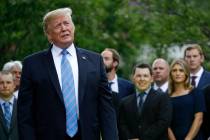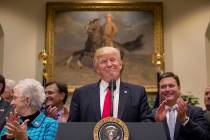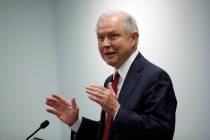Handicapping presidential candidates’ foreign policy
After dozens of contests featuring cliffhangers, buzzer- beaters and a ton of flagrant fouls, we’re down to the Final Four: Sanders, Clinton, Cruz and Trump. (If Kasich pulls a miracle, he’ll get his own column.) The world wants to know: What are their foreign policies?
Herewith, four candidates and four schools: pacifist, internationalist, unilateralist and mercantilist.
(1) Bernie Sanders, pacifist.
His pacifism is part swords-into-plowshares utopianism, part get-thee-gone isolationism. Emblematic was the Nov. 14 Democratic debate, which was supposed to focus on the economy but occurred the day after the Paris massacre. Sanders objected to starting the debate with a question about Paris. He did not prevail, however, and answered the first question with some anti-terror pablum that immediately gave way to an impassioned attack on his usual “handful of billionaires.”
Sanders boasts of voting against the Iraq War. But he also voted against the 1991 Gulf War. His reaction to all such dilemmas is the same anti-imperialist/pacifist reflex: Stay away, but if we must get involved, let others lead.
That’s for means. As for ends, Sanders’ foreign policy objectives are invariably global and universal, beginning above all with climate change. The rest is foreign policy-as-social-work do-goodism, most especially undoing the work of U.S. imperialism.
Don’t be surprised if President Sanders hands Guantanamo Bay over to the Castros, although Alaska looks relatively safe for now.
Closest historical analog: George McGovern.
(2) Hillary Clinton, internationalist.
The “Clinton/Obama” foreign policy from Ukraine to Iran to the South China Sea has been a demonstrable failure. But in trying to figure out what President Clinton would do in the future, we need to note that she often gave contrary advice — generally more assertive and aggressive than President Barack Obama’s — that was overruled, most notably, keeping troops in Iraq beyond 2011 and early arming of the Syrian rebels.
The Libya adventure was her grand attempt at humanitarian interventionism. She’s been chastened by the disaster that followed.
Her worldview is traditional, post-Vietnam liberal internationalism — America as the indispensable nation, but consciously restraining its exercise of power through multilateralism and near-obsessive legalism.
Closest historical analog: the Bill Clinton foreign policy of the 1990s.
(3) Ted Cruz, unilateralist.
The most aggressive of the three contenders thus far. Wants post-Cold War U.S. leadership restored. Is prepared to take risks and act alone when necessary. Pledges to tear up the Iran deal, cement the U.S.-Israel alliance and carpet bomb the Islamic State.
Overdoes it with “carpet” — it implies Dresden — although it was likely just an attempt at rhetorical emphasis. He’s of the school that will not delay action while waiting on feckless allies or farcical entities like the United Nations.
Closest analog: Ronald Reagan.
(4) Donald Trump, mercantilist.
He promises to make America strong, for which, he explains, he must first make America rich. Treating countries like companies, he therefore promises to play turnaround artist for a foreign policy that is currently a hopeless money-losing operation in which our allies take us for fools and suck us dry.
You could put the Sanders, Clinton and Cruz foreign policies on a recognizable ideological spectrum, left to right. But not Trump’s. It inhabits a different space because it lacks any geopolitical coherence. It’s all about money. He sees no particular purpose for allies or foreign bases. They are simply a financial drain.
Imperial Spain roamed and ravaged the world in search of gold. Trump advocates a kinder, gentler form of wealth transfer from abroad, though equally gold-oriented.
Thus, if Japan and South Korea don’t pony up more money for our troops stationed there, we go home. The possible effects on the balance of power in the Pacific Rim or on Chinese hegemonic designs don’t enter into the equation.
Same for NATO. If those free-riding European leeches don’t give us more money too, why stick around? Concerns about tempting Russian ambitions and/or aggression are nowhere in sight.
The one exception to this singular focus on foreign policy as a form of national enrichment is the Islamic State. Trump’s goal is simple — “bomb the [expletive] out of them.” Yet even here, he can’t quite stifle his mercantilist impulses, insisting that after crushing the Islamic State, he’ll keep their oil. Whatever that means.
Closest historical analog: King Philip II of Spain (1556-1598).
On Jan. 20, one of these four contenders will be sworn in as president. And one of these four approaches to the world will become the foreign policy of the United States.
Don’t say you weren’t warned.
Charles Krauthammer (letters@charleskrauthammer.com) is a Washington Post columnist.












